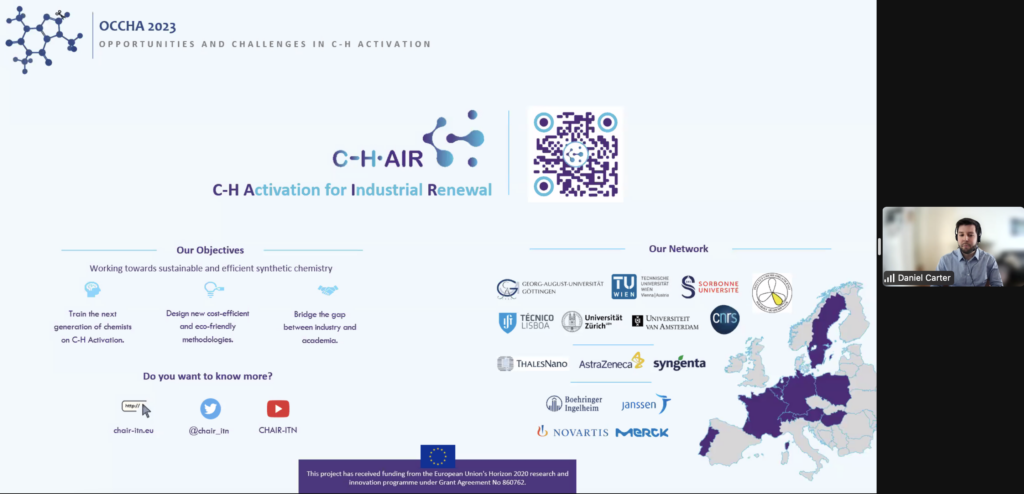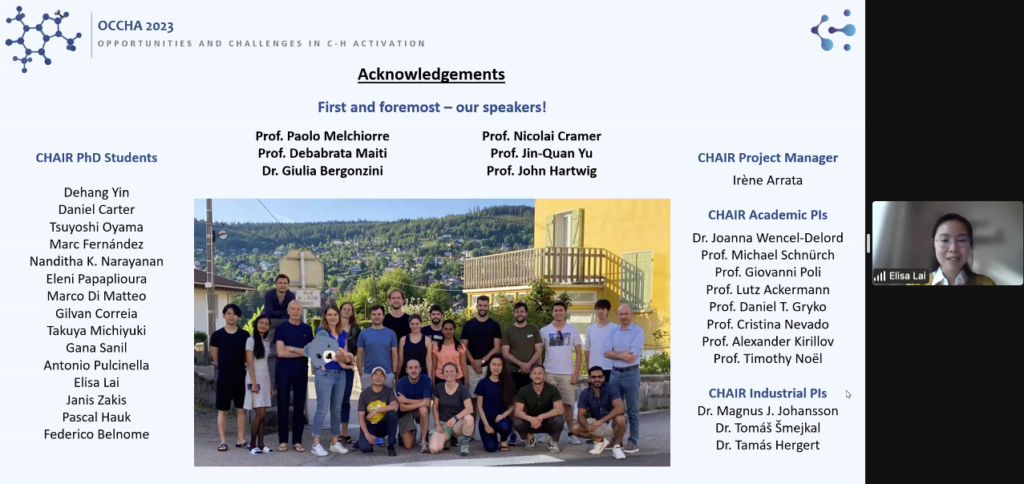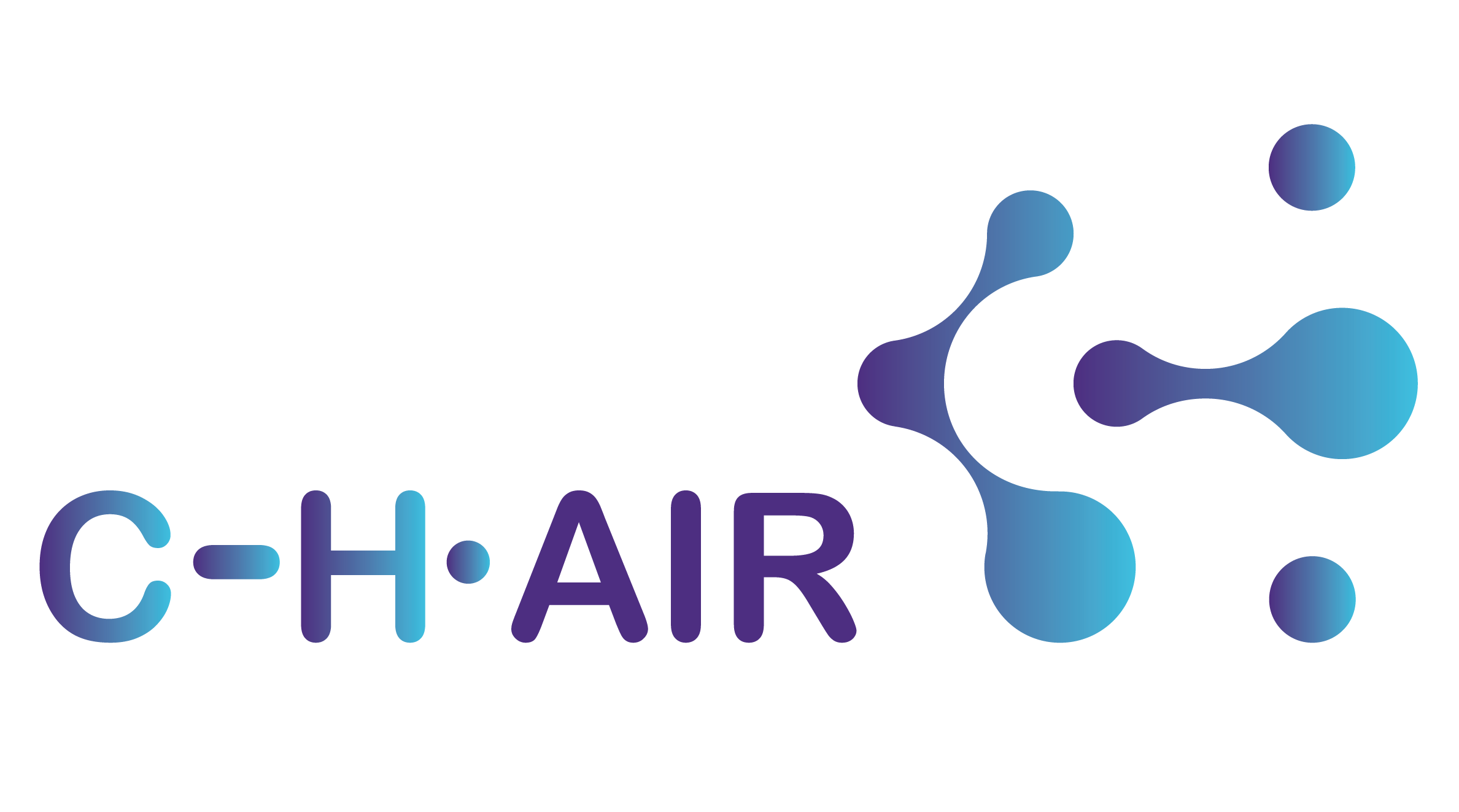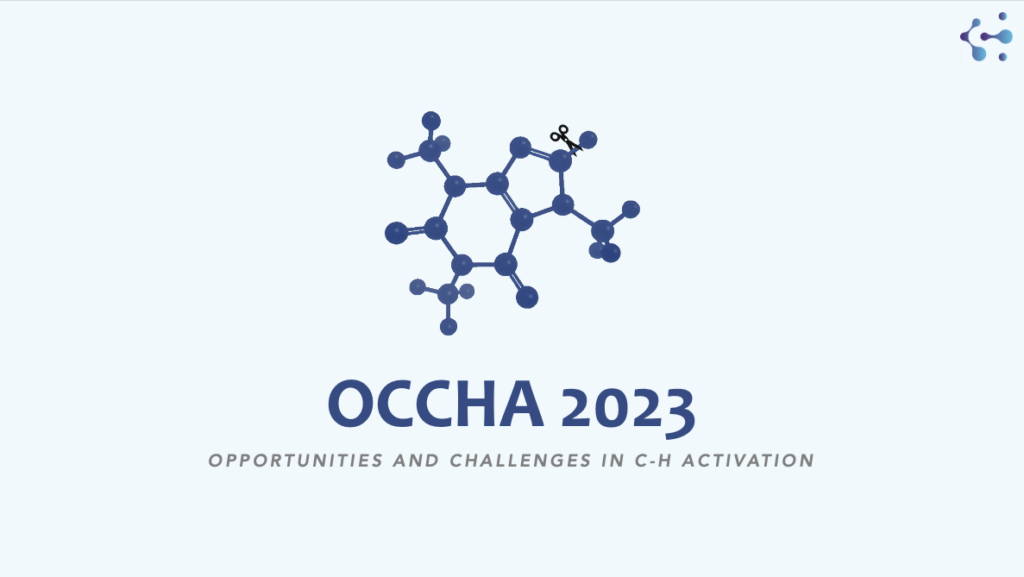Following the CHAIR consortium meeting in February 2023, we have tasked our ESRs to organise an online symposium. The objective was to challenge and empower the students by giving them as much freedom as possible and as little guidance as possible – although help was, of course, available if needed.
The project manager, Irene Arrata, has interviewed the ESRs involved in the organisation of the consortium – Daniel Carter, Marc Fernandez, Elisa Lai, Eleni Papaplioura, Nanditha Narayanan, Marco Di Matteo and Federico Belnome – to better understand their experience.
OCCHA23: a recap from the organisers’ perspective
Right after we announced the task, the ESRs gathered and discussed a strategy. Their first step was to create the core working group and set the motivations and expectations for the symposium. From our ESRs testimonies, a few core topics emerged.
Teamwork, networking, and an opportunity to learn
“I decided to actively participate in the organisation of the symposium not only because I knew I would learn a lot through this process, but also because I believe in teamwork”, said Eleni. Teamwork is also at the core of Federico’s feedback: “Collaboration is key to achieve anything. While we could not predict all the problems we will face, the support from the team was very helpful.”
This task was also perceived as a challenge and an opportunity to learn and network. Daniel considers that “actively participating in the organisation allowed [him] to gain valuable experience in event management and network with colleagues and professionals.” Nanditha added that she “gained practical experience in event planning while simultaneously building relationships and expanding [her] professional network”.
Looking at his career development plan, Federico considers that “one day, [he] might have to organise an important conference by [himself]; so this first experience is invaluable”.
For Marc, “having direct contact with the speakers, in contrast to just attending a congress, was a plus. [He] also though it would be a good chance to get out of [his] comfort zone since [he] would have to be the host in front of hundreds of people.”
Promoting the CHAIR project, our research and opening up to new opportunities
Our ESRs carry a strong identity through their consortium. Daniel felt the event “was a chance to promote the work of our consortium and, who knows, even foster future collaborations within the field of C-H Activation”. “It also felt like we, the CHAIRs, are appreciated and valued by the chemistry community”, added Eleni.
Once the core group was formed and the key principles of the symposium were set, the ESRs moved on to the most important yet quite scary part: choosing the speakers, and inviting them.
Choosing and inviting the speakers
“When it came to choosing our speakers, we decided to aim high and make the most of the virtual format” says Daniel. “We also tried to give voice to new/young PIs which are of course not as well known in the community. I think it is also important to highlight the young researchers”, added Marc.
Of course, the ESRs interest in their research was a key criteria in selecting the speakers, as Marco testifies: “Although the CHAIR consortium is focused on C-H activation, we decided to widen the field to C-H functionalization. I’ve personally heard a lot of Prof. Paolo Melchiorre since I was studying during my bachelor and master degree in Bologna. That’s why I suggested him as a speaker and I felt so grateful when my colleagues agreed with my proposal”.
“Suggesting our favourite international experts in the field, bravely contacting them and being surprised when they accepted our invitations, was the most fun part of the organisation”, according to Eleni. Although, the fun and excitement came with lots of stress and preparation. “A lot of drafting and discussion was made to perfect the emails that we sent out. None of us had any experience in organising such an event” mentioned Elisa. Marco confirmed this feeling. “As a PhD student, when you are reading articles from important chemistry journals, you consider these speakers as unreachable.”
Yet the ESRs were almost overwhelmed by the support received. Marco “was so surprised when [he] realised how great [their] the panel of speakers was, seeing how flexible and supportive they were of an event organised by students.” Nanditha found the speaker’s “willingness and enthusiasm to participate in the symposium truly humbling”, while Marc “did not expect that someone who is so busy would reply to [his] email”. Daniel felt that “their positive responses not only demonstrated their genuine interest in contributing to the symposium but also their support for the next generation of researchers.” A support that was explicitly expressed by the speakers on the day.
With hindsight, Elisa realised that “if [she] got a chance to do it again, [she] would try to propose more female speakers. Female scientists are under-represented, but they are very inspiring to the fellow students like [her].”
On the day of OCCHA23
The day of the symposium, the ESRs were torn between excitement, nervousness, and a strong feeling of pride. With such a headline, the event attracted a lot of scientists in the audience, from students to renowned professors, from all over the world.
“We received an overwhelming number of registrations, exceeding 1000, and a peak attendee count of 550 people throughout the day” mentions Daniel, who managed the webinar.
Although they did not let it show, stress was present for the ESRs who chaired the sessions.
“On the day of the symposium, I was a bit nervous at first. I was worried about possible IT or connectivity issues, but in the end everything went swimmingly. As chair of the first talk, I felt responsible for keeping things running smoothly at the start of the symposium” said Daniel. “A bit anxious at first”, Federico managed to “remain calm during [his] session, seeing how everything went so smoothly”.

Elisa was both nervous and excited: “Timing was crucial to chair the symposium so I felt constantly under pressure to put everything on track. At the same time, I learnt a lot from the talks. It was a huge sense of achievement knowing that the audience might benefit from the talks too.”
Marc also shared this feeling: “I was really nervous having to introduce the speakers as well as reading the questions in front of everyone. I was also really excited to see that we had more than 500 participants! So many people were attending a symposium that was organised by PhD students, so that’s not something that happens every day!”
Yet, the chairing ESRs could count on the moral support of the rest of the group, like Marco who was confident that “everything was going to be fine. We spent quite a lot of time on the preparation of the event and there was no reason to be worried.”
A great success overall
“The event surpassed all expectations”, concludes Daniel. “The decision to organise, with the help of my colleagues, this unique symposium has proven to be very rewarding. It was a great privilege to virtually meet and interact with professionals in the field of Organic Chemistry and C-H Activation, an experience for which I am very grateful.”
A feeling shared by Nanditha, who testified that “everything went smoothly and the sessions were fantastic; in particular, [she] loved hearing Paolo Melchiorre’s and John Hartwig’s talks. That was excellent. Overall [she] loved it and was happy that we could all work together to make it a success.” Finally, Eleni “felt very honoured and proud that [they] managed to have such a collection of eminent speakers presenting their research while so many people attended and enjoyed [their] initiative.”
From this enriching experience, a take-home message from Marco to anyone who considers planning a similar event: “plan in advance, be prepared for everything, focus on the little details, don’t be afraid of contacting the speakers, find colleagues with your same motivations and just do it.”

The CHAIR consortium warmly congratulates the ESRs involved, thanks the speakers who accepted the invitation, as well as the many registered people who attended the symposium.

